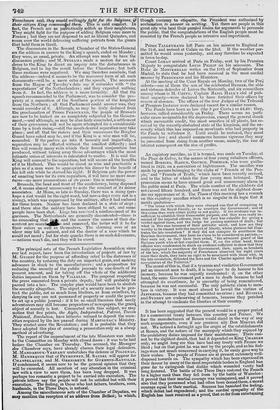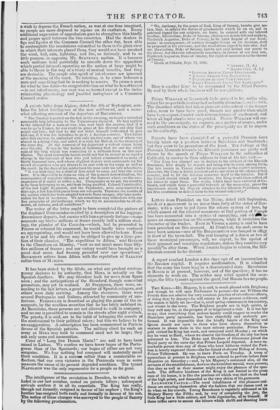It has been suggested that the present would be a
proper period for a commercial treaty between this country and France. We fear the manufacturers of Rouen would stand in- the way of any such arrangements, even if our precious ally Don MIGUEL did not. We noticed a fortnight ago the origin of the establishments at Rotten, and the nature of the monopoly which they enjoyed by the prohibitory duties imposed for their maintenance. There can- not be the slightest doubt, that had it depended on King CHARLES only, we might long ere this have had any treaty with France we liked ; but on that point he was met by the people, and as his feel- ings were not much concerned in carrying it, he easily gave way to their wishes. The people of France are at present extremely well- disposed towards us. The sympathy which has been expressed in their favour by many of the most respectable bodies in England has gone far to extinguish that dislike which wounded vanity had long fostered. The battle of the Three Days restored the French to a higher rank than they fell from by the battle of Waterloo : it proved that their martial courage was unimpaired, and it proved also that they possessed what had often been denied them, a moral courage equal to their martial. Success has banished the feeling, which defeat had engendered; and the cordial sympathy of the English has been received as a proof, that so far from entertaining a wish to depress the French nation, as was at one time imagined, no people are more disposed to rejoice on its exaltation. Every additional expression of approbation goes to strengthen this kindly and proper spirit between the two countries. Had the dealers in figs and figures at the Common Council the other day, been able to contemplate the resolutions submitted to them in the plain view in which their interests placed them, they would not have invoked the wind, hail, rain, lightning, and fire, so furiously, and to so little purpose, in opposing Mr. STEVENS.S motion. It is because such motions tend powerfully to smooth down the opposition which partial interests operating on the nation at large might be able to throw in the. way of a treaty of mutual benefits, that they are desirable. The people who speak of interference are ignorant of the meaning of the word. To interfere, is to come between a man and something that he is seeking to secure. To praise a man for what he has done—to congratulate him on what he has obtained —is not interference, nor ever was so termed except in the indis- criminating phraseology and jumbled metaphors of a Common Council orator.



























 Previous page
Previous page